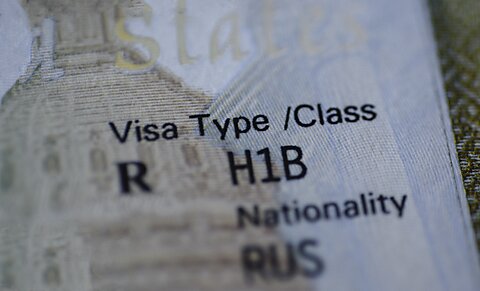David J. Bier
The employer‐sponsored green card system is so backlogged, delayed, and overregulated that it is nearly impossible for foreign workers to get through without first obtaining a work visa. The H‑1B visa is the main option available. All applicants must have at least a bachelor’s degree, and two‐thirds have a master’s degree or higher. H‑1B workers have wages in the top 10 percent of workers nationwide. Unfortunately, the H‑1B visa also has a low cap of 85,000 for most types of jobs.
As a result of the cap, the government has awarded H‑1B visas through a lottery since 2014. This week, US Citizenship and Immigration Services (USCIS) announced that it received nearly half a million lottery entries for the 2025 fiscal year (which starts in October). It selected 120,603 individuals to move on to the application stage (25.6 percent), and of those selectees, just 85,000 will receive a visa.
Ultimately, just 18.1 percent of lottery entries will result in someone receiving H‑1B status. In other words, 82 percent of these skilled workers will be denied permission to work in the United States in H‑1B status.
For the FY 2021 lottery, the government introduced a new application method. Rather than submitting a complicated petition containing all the information necessary to obtain an H‑1B visa, it established a streamlined process. This allowed employers to register for the lottery for a small fee and provide only basic information about the worker. While this change was an improvement, it also made it easier for workers to line up multiple employers to submit registrations on their behalf, as there was little cost to doing so. This phenomenon reached its peak in FY 2024, when a majority of the 758,994 entrants had multiple employers petitioning for them, which increased their odds of winning.
For the FY 2025 lottery, the government changed the system again. This year’s lottery selected specific workers rather than employers, so having multiple submissions did not affect a worker’s odds of winning. Every worker received equal odds. Though it may have disadvantaged the go‐getters who actively pursued multiple offers, this change was certainly fair. However, some people anticipated that it would improve the overall odds of winning the lottery, which it did not.
The H‑1B lottery has always proceeded in three stages. First, the applicant enters the lottery. Second, the applicant is selected. Third, the applicant’s employer must petition for them. To account for various factors like applicants declining the offer, employers withdrawing, or denials of workers or employers, the government always selects more lottery “winners” than the final number that receive a visa.
In the FY 2024 lottery, there were so many entries with multiple job offers that the government selected more than twice as many winners as was necessary to fill the visa cap. With fewer double entries in FY 2025, it selected 66,000 fewer winners, so in both years, the overall odds of selection were just 24.8 percent for 2024 and 25.6 percent for 2025. By the third step, the number will fall to just 18.1 percent getting a visa (Figure 2).
The odds certainly did increase for individuals without multiple registrations submitted on their behalf, but the odds aren’t in anyone’s favor. There is nothing special about the number 85,000. Given the average wage for H‑1B workers at $130,000 per year, Congress is randomly turning away at least $61 billion in economic contributions for no reason. I have previously written about the kinds of reforms that Congress should be urgently pursuing for Regulation magazine:
The H‑1B visa’s restrictions are harming U.S. competitiveness and innovation. Ideally, the H‑1B cap should simply be eliminated, but at a minimum it should be updated to reflect the current demand for visas, which is about four times the available visas. Moreover, visas that go unused or are revoked should be added back to the cap, and when an H‑1B worker receives a green card, the H‑1B slot should go to another applicant. These changes would put the focus on at least maintaining the stock of H‑1B workers rather than on the annual number of visas issued.
The longer Congress waits, the worse the situation becomes. Talent will increasingly flock to countries like Canada, Australia, the United Kingdom, Germany, India, China, and others that would welcome these workers. Where talent gravitates, much of the innovation, investment, and economic growth will follow suit.

